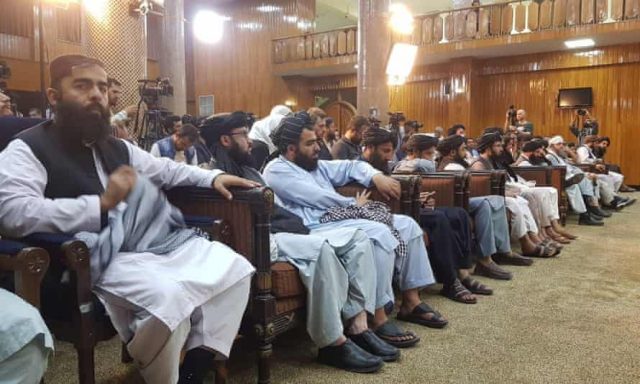bbc– Dozens of women in Kabul and the north-eastern Afghan province of Badakhshan have protested against the formation of an all-male interim Taliban government to rule Afghanistan.
Demonstrators said they would not accept a government with no women ministers.
Some women were reportedly beaten before the protests were dispersed.
Local news organisation Etilaatroz said some of its journalists were detained and beaten for covering the rally.
The Taliban, who have not responded to the allegations, warned that such protests were illegal.
They have said protesters needed permission to march, and should not use what they called abusive language.
On Tuesday, three people were killed during a demonstration in the western city of Herat.
The EU said the Islamist group had reneged on promises to make their government “inclusive and representative”, while the US also expressed concern that the interim government includes figures linked to attacks on US forces.
Addressing reporters after a virtual meeting of 20 Western nations on Wednesday, US Secretary of State Antony Blinken said the Taliban’s government “certainly does not meet the test of inclusivity, and it includes people who have very challenging track records”.
“The Taliban seek international legitimacy and support – any legitimacy, any support, will have to be earned,” he said.
But China said on Wednesday that it welcomed the end of what it called “three weeks of anarchy” in Afghanistan, and pledged $31m (£22m) in immediate aid.
The formation of an interim government, China’s foreign ministry spokesman Wang Wenbin told reporters, is “a necessary step to restore order and rebuild the country”.
The anti-Taliban National Resistance Front of Afghanistan (NRF) have urged the international community not to recognise the new government, calling the cabinet “illegal” and “a clear sign of the group’s enmity with the Afghan people”.
The NRF, led by Ahmad Massoud, the son of the late resistance icon Ahmad Shah Massoud, have been fighting Taliban militants in the Panjshir Valley north of Kabul, which was Afghanistan’s last anti-Taliban stronghold.
The Taliban insist they have now defeated the NRF in Panjshir, but NRF leaders say they are still fighting.
The new government
On Tuesday the Taliban announced the first appointments to their interim cabinet, which will be led by Mullah Mohammad Hassan Akhund.
Hassan Akhund served as foreign minister, and then later deputy prime minister, when the Taliban last ruled Afghanistan from 1996 to 2001. Like many of the new cabinet ministers he is under UN sanctions for his position in that government.
Speaking to Qatar-based broadcaster Al Jazeera on Wednesday, Hassan Akhund said former Afghan officials should return to the country and that their security and safety would be guaranteed.
He said Taliban leaders face great responsibility towards the Afghan people, adding: “We have suffered heavy losses for this historical moment and the era of bloodshed in Afghanistan is over.”
Another incoming minister, Sirajuddin Haqqani, is head of the notorious Haqqani network.
- Who’s who in the Taliban leadership
Unlike the wider Taliban, the Haqqani network has been designated a foreign terrorist organisation by the US. It also maintains close ties to al-Qaeda.
The FBI says Haqqani was behind some of the deadliest attacks of the 20-year-long war, including a truck bomb explosion in Kabul in 2017 that killed more than 150 people.
He is wanted by the FBI over a 2008 attack on a hotel that killed an American.
The Taliban seized control of Afghanistan in a sweeping offensive more than three weeks ago. They now face many tough challenges in the conflict-torn country, including stabilising the economy and gaining international recognition.
Ministers told to implement ‘Islamic law’
Earlier on Tuesday, a statement attributed to Taliban Supreme Leader Mawlawi Hibatullah Akhundzada told the government to uphold Sharia law – Islam’s legal system. The Taliban have been known for their extremely hardline interpretation of Sharia.
The Taliban want “strong and healthy” relations with other countries and would respect international laws and treaties as long as they did not conflict with “Islamic law and the country’s national values”, the statement said.
- What does the Taliban’s version of religious law mean for women?
Hassan Akhund, the new interim prime minister, is influential on the religious side of the movement, rather than the military side.
His appointment is seen as a compromise, after recent reports of in-fighting between some relatively moderate Taliban figures and their hardline colleagues.
A movement which has long moved in the shadows, whose names would surface only on the world’s terrorism watch lists, is now announcing titles used in governments the world over.
Acting prime minister Mullah Akhund appears as a compromise candidate after reported rivalries among leading military and political figures who will serve under him.
Its caretaker nature also provides breathing space as the Taliban move from guns to government.
It also underlines the Taliban view that a Taliban victory can only mean Taliban rule. Sources say they pushed back against calls for an “inclusive” government. They balked at including former political figures and officials, who’ve had their turn at the top, and especially those tainted by corruption.
“Why should we let others pick our cabinet when other countries pick their own? “was one retort.
As for women, there was never a chance they would be given a ministerial role; the ministry of women’s affairs seems to have been, for now, abolished altogether.
Other appointments to the new government include:
- Mullah Yaqoob as acting defence minister. He is the son of Taliban founder and late supreme leader Mullah Omar
- Taliban co-founder Mullah Abdul Ghani Baradar will be one of the PM’s deputies. He oversaw the signing of the US withdrawal agreement last year
- Amir Khan Muttaqi, an interim foreign minister, also took part in the withdrawal talks







